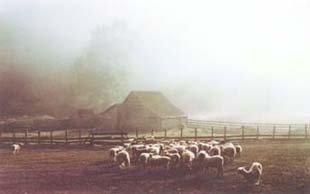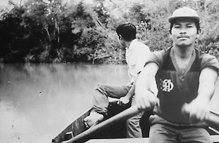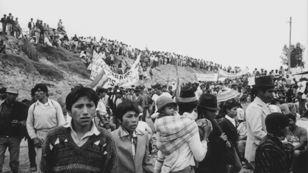

Chile
For over 20 years, the Pehuenche-Mapuche people in the Biobio region of Chile have fought the onslaught of neo-liberal government policies that have gradually pushed them into smaller territories. The last ten thousand remaining Indigenous Pehuenche individuals have been battling a company that began building a hydroelectric dam along the Biobío River in 1989. The Pangue plant is one in a series of dam projects, of which the most recent is the Ralco plant. All of the dams combined will flood close to 26,000 hectares of river, 35,000 hectares of native forest and displace close to 10,000 Indigenous people from the Mapuche-Pehuenche communities. After years of protests, the Pehuenche people have obtained the support of prominent international experts on environmental issues and the Chilean environmentalist groups. All agree that Pangue, S.A. which is one of the daughter companies of Endesa, the utilities giant, has violated Chilean law protecting Indigenous rights and territories. Pangue, S.A. has also avoided compliance with the World Bank and the International Finance Corporation who gave credit to the project with provisions that established environmental and social standards to protect the Pehuenche people and the surrounding biodiversity. Pangue, S.A. has also engaged in a media campaign that portrays their project as bringing jobs to the area, currently holding 50% of country's poor. This campaign has divided the Pehuenche community, and Pangue, S.A. has used this division in their favor to plow ahead with the Ralco project. The Chilean government has sided with Pangue, S.A. and the resettlement plan of Pehuenche communities without regard for the ensuing destruction of Pehuenche culture. Contrary to arguments used by Pangue, S.A spokes-people the lands given as compensation for original territories are of lower quality and have not improved the lives of Pehuenche families.

Hurricane Mitch Relief Effort
Hurricane Mitch, which in late October left some Central American countries completely devastated, hit Indigenous communities along the Atlantic Coast especially hard because of prior environmental degradation and extreme poverty. These communities were already isolated and in an extremely precarious state before Mitch struck. Not only did they lack the most basic infrastructure and services, but many homes were built with makeshift materials on the sides of mountains and floodplains which had been cleared for firewood or subsistence farming. These homes were swept away by floodwater or buried under the mud. Approximately 11,000 Nicaraguans and Hondurans died during the hurricane. Nicaragua suffered $1 billion in damages. Honduras was the country hardest hit, with 5,600 people killed, 8,000 people missing, 1 million people displaced and $5 billion in damages. Many primarily Indigenous and black towns and cities were left isolated and destroyed, and for weeks after the hurricane there were no reports from the Government or the media on conditions in the area.
During this time, Abya Yala Fund received requests from Indigenous organizations in Honduras, El Salvador, Nicaragua and Guatemala. An organization called Confederación de Pueblos Autóctonos de Honduras (CONPAH) was selected by AYF because of its history of successful work with Indigenous communities on the Atlantic Coast. CONPAH is a confederation of Native Peoples of Honduras, a national umbrella of Indigenous Peoples' communities and organizations, including four main Indigenous nations: Miskitu, Garífuna, Tolupan, and Xicaque. The areas that were hardest hit by Mitch in Honduras were: Bahía, Colon, Gracias a Dios, Atlantida, Cortes and Yoro. The lack of medicines, food and clean water heightens the threat of disease and malnutrition which could result in the death of many more people. Abya Yala raised a total of $42,964.97 for the relief effort. This money was divided among several Indigenous organizations who requested funds to cover specific needs. CONPAH requested money for medicines to combat diseases like malaria, and other infections; MASTA, a Miskitu organization in Honduras is restoring their damaged drinking water system; ANIS, the National Indigenous Salvadoran Association proposed a housing reconstruction project where community members themselves would build homes; FUMEDI, CODEFIM and ADEP requested funding to rebuild housing in the Maya-Mam communities of Huehuetenango and Sololá in Guatemala; and "Pana Pana," the Association for the Development of the Atlantic Cost, is restoring damaged Miskitu agricultural lands in Rio Coco, Nicaragua. With Abya Yala's help, Indigenous people are rebuilding their homes and have been able to secure food to hold them over until new crops can be harvested. Increased funding for Indigenous Peoples in Central America will be needed for several years to rebuild infrastructure and restore agricultural lands.

Ecuador
Texaco was sued by 300,000 Indigenous groups in Ecuador for having caused environmental health damages during the production of crude oil in the Amazon and for inappropriate methods used for over 25 years. The Ecuadorian government has repeatedly failed to protect the interests of its people and the environment by allowing Texaco to use the rivers of the Amazon as waste pits. Texaco has dumped over 4 million gallons of toxic chemicals daily into the river system. To this, the government responded by signing a contract that absolved Texaco from any responsibility for polluting the river system. United States courts declared that the case against Texaco should proceed. However, this decision required that the Ecuadorian government cooperate and include claims of "inappropriate technology and environmental damage." The case was dismissed in 1997 due to the government's failure to respond. Last year the 2nd Circuit U.S. Court of Appeals decided to reinstate the case and ordered the judge to determine if the case should be heard in American or Ecuadorian courts. This rule is still pending.
Mexico
In recent months, the Binational Indigenous Front from Oaxaca (FIOB by its Spanish acronym) has experienced a series of attacks on its membership. The most recent incidents occurred on February 12 in the state of Oaxaca, Mexico. Eutiquio Pimentel Salas, a brother of the president of La Union de los Taxistas, an affiliated organization of FIOB, was gunned down and killed. That same day, the father of FIOB's director, Angel Pimentel, was attacked and injured. These two tragic incidents follow a prior attack against Arturo Pimentel Salas, the Director of FIOB on January 15 and other acts of aggression against the organization. FIOB is a Mixtec organization that supports Indigenous people from Oaxaca and its growing populations in different parts of Mexico and the U.S. FIOB has identified the attackers of Eutiquio Pimentel and Angel Pimentel as Juventino Domingo Morales, Jesús Galicia, Adán Hernández and Santiago Cuevas, all of whom have direct ties to the Institutional Revolutionary Party (PRI). These men have not been apprehended or questioned, and members of FIOB are asking people on both sides of the border to contact the authorities in Oaxaca and the Federal government, and demand that justice be served. These incidents are consistent with a policy of terror against Indigenous people all over the country. They are designed to frighten and discourage Indigenous people from organizing and becoming part of an independent entity that fights for their human rights on both sides of the border. FIOB, in the meantime, has vowed to continue their work irregardless of the attacks against its membership saying they will not be intimidated.
Return to living traditions
English Home